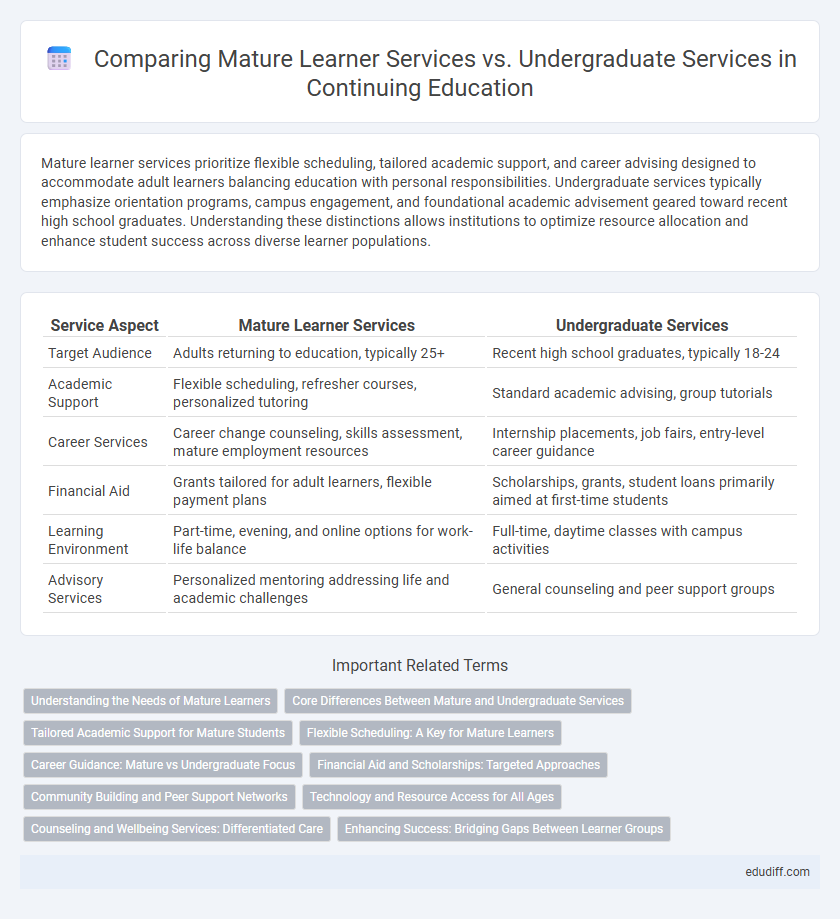Mature learner services prioritize flexible scheduling, tailored academic support, and career advising designed to accommodate adult learners balancing education with personal responsibilities. Undergraduate services typically emphasize orientation programs, campus engagement, and foundational academic advisement geared toward recent high school graduates. Understanding these distinctions allows institutions to optimize resource allocation and enhance student success across diverse learner populations.
Table of Comparison
| Service Aspect | Mature Learner Services | Undergraduate Services |
|---|---|---|
| Target Audience | Adults returning to education, typically 25+ | Recent high school graduates, typically 18-24 |
| Academic Support | Flexible scheduling, refresher courses, personalized tutoring | Standard academic advising, group tutorials |
| Career Services | Career change counseling, skills assessment, mature employment resources | Internship placements, job fairs, entry-level career guidance |
| Financial Aid | Grants tailored for adult learners, flexible payment plans | Scholarships, grants, student loans primarily aimed at first-time students |
| Learning Environment | Part-time, evening, and online options for work-life balance | Full-time, daytime classes with campus activities |
| Advisory Services | Personalized mentoring addressing life and academic challenges | General counseling and peer support groups |
Understanding the Needs of Mature Learners
Mature learner services prioritize flexible scheduling, recognition of prior experience, and tailored support to accommodate diverse life commitments. These services contrast with undergraduate services, which typically focus on traditional academic pathways and campus-based resources. Understanding mature learners' needs involves emphasizing practical skill development, career transitions, and accessible learning formats to enhance engagement and success rates.
Core Differences Between Mature and Undergraduate Services
Mature learner services emphasize flexible scheduling, personalized academic advising, and career transition support tailored to adult students balancing education with work or family responsibilities. Undergraduate services typically focus on campus-based resources, social integration opportunities, and traditional academic counseling designed for recent high school graduates. Core differences center on catering to diverse life circumstances and learning preferences, with mature services prioritizing accessibility and practical application while undergraduate services emphasize community building and foundational academic development.
Tailored Academic Support for Mature Students
Mature learner services prioritize tailored academic support by offering flexible scheduling, personalized tutoring, and recognition of prior learning to meet the unique needs of adult students balancing education with work and family commitments. Unlike standard undergraduate services, these programs emphasize experiential learning integration and targeted career advising specific to mature student goals. Enhanced support structures such as peer mentoring and customized orientation sessions further empower mature learners to succeed academically and professionally.
Flexible Scheduling: A Key for Mature Learners
Flexible scheduling is a pivotal service offered to mature learners, accommodating their unique responsibilities such as work and family commitments. Unlike traditional undergraduate services that often follow rigid timetables, mature learner programs emphasize evening, weekend, and online class options to enhance accessibility. This tailored approach significantly improves retention and success rates among adult students balancing education with other life demands.
Career Guidance: Mature vs Undergraduate Focus
Career guidance for mature learners emphasizes flexible, experience-based pathways tailored to career transitions and upskilling, while undergraduate services prioritize exploration of academic and professional options for early career planning. Mature learner programs often include personalized counseling, recognition of prior learning, and support for balancing study with existing work commitments. Undergraduate career services typically offer internships, job fairs, and entry-level job preparation to facilitate smooth entry into the workforce.
Financial Aid and Scholarships: Targeted Approaches
Financial aid for mature learners often includes specialized scholarships and grants tailored to adult education, recognizing their unique financial responsibilities and return-to-study challenges. Undergraduate services typically offer a broader range of standardized scholarships aimed at recent high school graduates with merit-based criteria. Institutions increasingly design targeted financial aid packages to address the distinct needs of mature learners, enhancing access and retention through flexible funding options.
Community Building and Peer Support Networks
Mature learner services emphasize tailored community building that addresses unique challenges faced by adult students, fostering peer support networks focused on shared life experiences and flexible learning schedules. Undergraduate services cultivate vibrant social engagement through diverse campus activities and residence-based peer groups, promoting academic collaboration and social integration among younger students. Both frameworks prioritize creating inclusive environments but differ in approach, with mature learner programs centering on mentorship and support relevant to non-traditional student needs.
Technology and Resource Access for All Ages
Mature learner services emphasize tailored technology access and resources such as adaptive software, flexible online platforms, and dedicated tech support designed to accommodate diverse learning preferences and schedules. Undergraduate services typically provide standardized technology tools, including campus-wide Wi-Fi, learning management systems, and general tech labs that support a younger, more tech-savvy demographic. Both services prioritize equitable resource availability, ensuring seamless integration of digital tools to enhance learning outcomes across all age groups.
Counseling and Wellbeing Services: Differentiated Care
Mature learner services offer tailored counseling and wellbeing support that addresses unique challenges such as balancing education with work or family commitments, providing flexible appointment scheduling and specialized mental health resources. Undergraduate services focus on preventative care and developmental counseling that targets typical student stressors like academic pressure and social integration, often through group workshops and peer support programs. This differentiated care ensures that both mature learners and undergraduates receive personalized interventions aligned with their distinct life circumstances and wellbeing needs.
Enhancing Success: Bridging Gaps Between Learner Groups
Mature Learner Services and Undergraduate Services each address distinct academic and personal challenges, tailoring support to optimize success for diverse student populations. Mature learners benefit from flexible scheduling, career counseling, and prior learning assessments that recognize work experience, while undergraduate services emphasize foundational skill development and academic advising. Bridging gaps through integrated programs and collaborative initiatives fosters inclusivity, ensuring all learners access resources that enhance retention and achievement across academic levels.
Mature Learner Services vs Undergraduate Services Infographic

 edudiff.com
edudiff.com